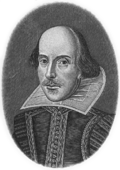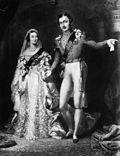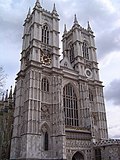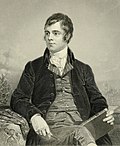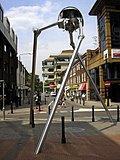Portal:United Kingdom
The United Kingdom Portal
 |
 |
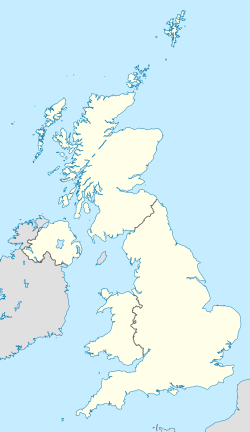
| |
The United Kingdom of Great Britain and Northern Ireland, commonly known as the United Kingdom (UK) or Britain, is a country in Northwestern Europe, off the coast of the continental mainland. It comprises England, Scotland, Wales, and Northern Ireland. The UK includes the island of Great Britain, the north-eastern part of the island of Ireland, and most of the smaller islands within the British Isles, covering 94,354 square miles (244,376 km2). Northern Ireland shares a land border with the Republic of Ireland; otherwise, the United Kingdom is surrounded by the Atlantic Ocean, the North Sea, the English Channel, the Celtic Sea, and the Irish Sea. The UK maintains sovereignty over the British Overseas Territories, which are located across various oceans and seas globally. The United Kingdom had an estimated population of over 68.2 million people in 2023. The capital and largest city of both England and the United Kingdom is London. The cities of Edinburgh, Cardiff, and Belfast are the national capitals of Scotland, Wales, and Northern Ireland, respectively.
The UK has been inhabited continuously since the Neolithic. In AD 43, the Roman conquest of Britain began; the Roman departure was followed by Anglo-Saxon settlement. In 1066, the Normans conquered England. With the end of the Wars of the Roses, the English state stabilised and began to grow in power, resulting by the 16th century in the annexation of Wales, and the establishment of the British Empire. Over the course of the 17th century, the role of the British monarchy was reduced, particularly as a result of the English Civil War. In 1707, the Kingdom of England and the Kingdom of Scotland united under the Treaty of Union to create the Kingdom of Great Britain. In the Georgian era, the office of prime minister became established. The Acts of Union 1800 incorporated the Kingdom of Ireland to create the United Kingdom of Great Britain and Ireland in 1801. Most of Ireland seceded from the UK in 1922 as the Irish Free State, and the Royal and Parliamentary Titles Act 1927 created the present United Kingdom.
The UK became the first industrialised country and was the world's foremost power for the majority of the 19th and early 20th centuries, particularly during the Pax Britannica between 1815 and 1914. The British Empire was the leading economic power for most of the 19th century, a position supported by its agricultural prosperity, its role as a dominant trading nation, a massive industrial capacity, significant technological achievements, and the rise of 19th-century London as the world's principal financial centre. At its height in the 1920s, the British Empire encompassed almost a quarter of the world's landmass and population, and was the largest empire in history. However, its involvement in the First World War and the Second World War damaged Britain's economic power and a global wave of decolonisation led to the independence of most British colonies. (Full article...)
Featured article
The Battle of Tory Island was a naval action of the French Revolutionary Wars, fought on 12 October 1798 between French and British squadrons off the northwest coast of Donegal in Ireland. The last action of the Irish Rebellion of 1798, the Battle of Tory Island ended the final attempt by the French Navy to land substantial numbers of soldiers in Ireland during the war. In May 1798 the Society of United Irishmen, led by Theobald Wolfe Tone, precipitated an uprising against British rule in Ireland. At the urging of the rebels a small French force under General Humbert was landed at Killala, but by early September both this expedition and the rebellion had been defeated. Unaware of the defeat, on 16 September the French despatched reinforcements. However, having missed one invasion force, the Royal Navy was on alert for another, and when the squadron carrying the reinforcements left Brest they were soon spotted. After a long chase, the French were brought to battle in a bay off Donegal close to Tory Island. During the action the outnumbered French attempted to escape, but were run down and defeated piecemeal, with the British capturing four ships and scattering the survivors. Over the next two weeks, British frigate patrols scoured the passage back to Brest, capturing three more ships. Of the ten ships in the original French squadron, only two frigates and a schooner reached safety. British losses in the campaign were minimal. The battle marked the last attempt by the French Navy to launch an invasion of any part of the British Isles. (Full article...)
Featured biography
Edward VI of England (1537–1553) became King of England and Ireland on 28 January 1547 and was crowned on 20 February at the age of nine. The son of Henry VIII and Jane Seymour, Edward was the third monarch of the Tudor dynasty and England's first Protestant ruler. During Edward’s reign, the realm was governed by a Regency Council, because he never reached maturity. The Council was led from 1547 to 1549 by his uncle Edward Seymour, 1st Duke of Somerset, and from 1550 to 1553 by John Dudley, 1st Earl of Warwick, who in 1551 became 1st Duke of Northumberland. Edward's reign was marked by economic problems, military withdrawal from Scotland and Boulogne-sur-Mer, and social unrest that in 1549 erupted into riot and rebellion. It also saw the transformation of the Anglican Church into a recognisably Protestant body. Henry VIII had severed the link between the Church of England and Rome, and during Edward's reign, Protestantism was established for the first time in England, with reforms that included the abolition of clerical celibacy and the mass, and the imposition of compulsory services in English. The architect of these reforms was Thomas Cranmer, Archbishop of Canterbury, whose Book of Common Prayer has proved lasting. (Full article...)
General images -
Subportals
WikiProjects
Things you can do
- Visit the British Wikipedians' notice board.
- The noticeboard is the central forum for information and discussion on editing related to the United Kingdom.
- Comment at the British deletion sorting page.
- This page lists deletion discussions on topics relating to the United Kingdom.
Featured pictures
Did you know -

- ... that Sting wrote "We Work the Black Seam" because he felt that "the case for coal was never put to the nation" during the 1984–85 British miners' strike, which began 40 years ago today?
- ... that Joanna Cherry showed a printed copy of an Internet meme featuring Lily Hoshikawa during a UK parliamentary committee meeting?
- ... that the Labour Party received their highest share of the vote to date in the 1951 UK general election but still lost to the Conservatives, who received fewer votes?
- ... that Change UK had eleven elected members of Parliament despite never actually winning an election?
- ... that the 2023 United Kingdom student protests were organised on TikTok and Snapchat?
- ... that Youlgreave in Derbyshire is one of only a few villages in the United Kingdom to be supplied by its own private waterworks?
In the news
- 16 April 2025 –
- The United Kingdom suspends the import of cheese and meat products from the European Union to prevent the spread of foot-and-mouth disease. (BBC News)
- 16 April 2025 – Transgender rights in the United Kingdom, For Women Scotland Ltd v The Scottish Ministers
- The Supreme Court of the United Kingdom rules that legal gender is based upon biological sex for the purposes of the Equality Act 2010. (BBC News)
- 15 April 2025 – Sudanese civil war, Foreign aid to Sudan
- The European Union and its member states pledge €522 million (US$590 million) and the United Kingdom pledges £120 million (US$141 million) in humanitarian aid to Sudan to deliver food and supplies to over 650,000 internally displaced Sudanese people affected by the fighting between the Rapid Support Forces and the Sudanese Armed Forces. The two groups also call for an immediate ceasefire to end the war. (DW) (AP)
- 14 April 2025 – Russian invasion of Ukraine
- United Kingdom and the Russian invasion of Ukraine
- The United Kingdom sends £752 million ($990 million) to Ukraine for the purchase of surface-to-air missiles, artillery and spare parts for fighter aircraft, as part of an international loan programme funded primarily through seized Russian financial assets. (Reuters)
- 14 April 2025 – July Revolution
- A court in Dhaka, Bangladesh, along with the Anti-Corruption Commission, issues an arrest warrant for Tulip Siddiq, a United Kingdom MP who is the niece of ousted former leader Sheikh Hasina, for corruption allegations. Siddiq has rebuked the arrest warrant and called it a "smear campaign" against her. (DW) (BBC News)
Categories
Other UK-connected Wikipedias
Wikimedia
The following Wikimedia Foundation sister projects provide more on this subject:
-
Commons
Free media repository -
Wikibooks
Free textbooks and manuals -
Wikidata
Free knowledge base -
Wikinews
Free-content news -
Wikiquote
Collection of quotations -
Wikisource
Free-content library -
Wikiversity
Free learning tools -
Wikivoyage
Free travel guide -
Wiktionary
Dictionary and thesaurus














































